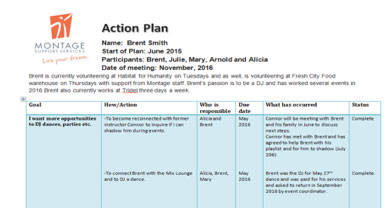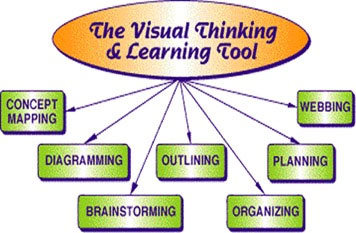Taking the time and effort to plan out what the process will look like is a great strategy for setting the stage for successful interactions and excellent outcomes. A planning facilitator will become more comfortable interacting with you and your network if the necessary time has been taken to be well prepared. In the beginning, the facilitator guides the planning process and is then guided by you and your network.
Helen Sanderson Associates suggest that you create a one-page Profile of who you are. “A One Page Profile captures all the important information about a person on a single sheet of paper under three simple headings: what people appreciate about me, what’s important to me and how best to support me.” http://helensandersonassociates.co.uk/person-centred-practice/one-page-profiles/. The facilitator can help you with this.
Through this preparation, the facilitator will also learn how you respond to the path, what the process is taking and makes any necessary adjustments. The facilitator wants you and your network to participate in the process and must be skilled at posing questions to encourage creative problem solving and collaboration. A facilitator will repeatedly check that they are not imposing their own interpretations on what’s being communicated.
Person-centred thinking is a set of skills and tools based on the values of independence, rights, choice and control, working together and inclusive communities. The presence of person-centred thinking is a necessary condition for delivering person-centred support and outcomes:
- Discover what is important to you in your day-to-day life now and for the future.
- Find out what is working and what is not working in your life, and what you want to change.
- Identify what support you need to live the life you choose.
- Create action plans so that you have more of what is important to you in your life, with the support that you require.
- Reflect and act on the action plan.
Meet and Greet
The planning process starts with the Meet and Greet. For the first meeting, the goal is to find some place where you are comfortable. The facilitator can use this opportunity to get to know you: what your interests are, and what is important in your life. Who are the people in your support group? Who do you want to include in the process?
Meet and Greet Questions the facilitator will ask:
- Who can we invite to your meeting?
- How can we build upon your already existing community?
- Communication, what works for you? How do you like to be understood?
- Are you receiving Passport funding, ODSP?
- What are your interests, talents, favorite places to go?
- How do you travel around the city?
- Your weekly schedule, what are you doing now? What is working and not working?
- What are some things I need to know about you to support you, ie. Places you would like to meet, with family, on your own. Allergies, likes, and dislikes?
- What is your biggest goal? If you don’t have the answer to that question that is what we will be exploring together?
Here is a video by Montage Support Services describing the Person Centre Planning Meet and Greet: Person Centred Planning Meet ‘n Greet (youtube.com)
Planning Session
Important Components the facilitator should consider for a Successful Planning Session
- Invite people who really know and care about you
- Share the reasons why people are invited to a planning meeting
- Describe the process so everyone knows what to expect and can think about the questions in advance, such as: describe the focus person, likes, gifts, role in community, what is needed for the person to be successful
- Consider if any accommodations are required, i.e. interpreters, communication aids, time limitations
- Inform people that the session could last approximately 2 to 3 hours
- Choose a meeting environment where people will feel most comfortable
- The environment for the planning session should be welcoming, i.e. food and refreshments for everyone to create an atmosphere of celebration
- The planning session must include you, otherwise re-schedule
- It is important to reduce distractions, i.e. cell phones on silent, people not moving in and out of the room all the time, a space with limited interruptions
Person-centred planning / review preparation booklet helps team members prepare
for the gathering. Whether they are going to be present at the review or have been asked to make a contribution, there are things that they will need to think about in advance. This booklet will help them to think about their contribution to the meeting.
A great resource is Helen Sanderson Associates: Person-Centred Reviews
Who should be invited to the planning meeting?
It is easier to list anyone connected to the focus person (you); then you and the facilitator can consider the roles of people during the planning meeting. Everyone plays an important role during the planning meeting.
- Focus person (you)
- Decides who attends the planning session
- Is supported to lead the planning meeting at all times
- Has first say in what goes in the plan
- Is one of the people responsible for every action plan
- Owns the plan
- Family
- Believes in the potential for their family member to live a meaningful life
- Helps their family member to express what is wanted and needed to live a meaningful life
- Advocates for the dreams and goals of their family member to be respected and followed
- Supports everyone to make the plan happen
- Assists in coordination of the plan to ensure outcomes
- Network
- Supports the focus person and family to enjoy the experience of person-directed planning
- Is respectful of your dreams and goals
- Sees your potential to live a meaningful life
- Contributes ideas and resources for the plan
- Maybe one of the people responsible for action plans
- Staff
- Supports you and your family so you are prepared for the planning sessions (i.e. purpose and questions)
- Supports you to express what is wanted and needed to live a meaningful life
- Respects and advocates for your dreams and goals
- Assists people to follow through on the action plans
- Supports in the coordination of the plan to ensure outcomes
- Coordinator(s)
- Other members of the team may be chosen to support you in this role
- One or more people may transcribe the visual plan into written format
- Distributes written plan to you (the owner the plan) and others selected
- Checks in with others to ensure implementation of the plan
- Reviews follow-up on action plans with the group
- Plan Facilitator
- Upholds the principles of person-directed planning
- Enables everyone in the group to participate in the planning meeting
- Promotes a positive outlook towards your dream or vision of the future
- Ensures the planning process really stays focused on your strengths, abilities and what you want
- Assists the group to develop clear, measurable, achievable outcomes (action plan)
Action Plans
An action plan can take many different forms, depending on your preferences and communication style. For the facilitator, it’s important to really get to know who you are in order to really understand how you would prefer your goals to be mapped and documented.
The most important part about having an Action Plan is that the goals that have been identified are tracked in such a way that there is a clear indication of:
- What the steps are toward achieving each goal
- Who is responsible for helping to achieve each step
- What the outcomes or observations were upon completion
- A due date attached each step to keep everyone moving forward
Action Plans can take many different forms which could include:
- An Action Plan Template providing a concrete template to organize goals, steps, who is responsible for each step, due date & outcomes
- A Scrapbooking Style that may include:
- Creating a collage of ideas
- Mapping out paths to your goals
- Expressing ideas visually using different textile materials
- Taking pictures along the way to document the journey and successes
- Using Inspiration Software https://www.inspiration-at.com/:
- Helps to organize thoughts and ideas
- Allows you to brainstorm any and all ideas and keep a record of them for future reference
- Helps to identify key concepts, ideas and dreams
- Allows visual mapping those who would like to plan with pictures, diagrams or charts rather than words
- Using a Storybook Style:
You are creating a book about your interests, goals, and dreams that can help you to map out some ideas and potential goals. It is also nice to create something that you can have reference to for years to come. You may choose to share the book with others you are meeting for the first time as it may help you to share with others a little about yourself.


Watch a video by Montage Support Services talking about Smart Goals: Lets talk about SMART GOALS (youtube.com)
